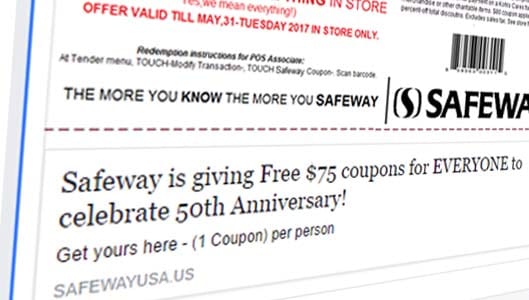Top 5 Facebook Scams to Avoid
It isn’t a surprise that Facebook is a platform frequently targeted by criminals. After all, wherever large crowds gather, be it online or off, crime invariably follows. And Facebook boasts the largest crowd in cyberspace.
Facebook is a haven for all sorts of cyber scammers. The criminals who operate on social media sites like Facebook are as diverse as the scams they orchestrate. Yet some scams are more popular than others. So we take a look at the top 5 Facebook scams you’ll likely going to encounter on the social networking platform.
Your account will be disabled (unless you click this link)
This scheme is a classic phishing scam where scammers will pretend to be from Facebook Security and send you a threatening message to lull you into clicking a link that leads to a spoof webpage.
Typically this scheme is initiated by the scammer sending you a message either through e-mail or through Facebook chat. (If it’s the latter, then this probably means the scammer has compromised a Facebook account belonging to one of your friends, and changed the information to make that account appear to belong to Facebook. This is how the scammer managed to send you a chat message.)
The message sent from the scammer will typically threaten your Facebook account with deletion or suspension for some “violation”. Of course the exact phrasing may vary depending on the scammer. The message includes a link to save your Facebook account, which leads to a spoof webpage that looks identical or similar to the Facebook login page. That page, however, will steal your login information and send it to the scammer, giving them access to your account (if you don’t have login approvals enabled.)
Sponsored Content. Continued below...
Facebook cloning
Facebook cloning has become one of the most popular schemes on Facebook, and is a way scammers trick Facebook users into accepting a friend request under the belief they are accepting a request from one of their friends. Once accepted as a friend, the scammer can then initiate any number of other scams.
Facebook cloning is when crooks set up a duplicate ‘clone’ account to a Facebook user. Let’s call that user Person A. The crook can easily clone Person A’s account by creating a brand new account and using Person A’s profile picture and name, both of which are public. They can also replicate any other public information on Person A’s account.
Now the crook has a seemingly identical Facebook account, and will now use Person A’s friends list to send a friend request to Person A’s friends. This can include Person B. Person B accepts the friend request from Person A, perhaps assuming that Person A lost access to their original account.
The crook is now friends with Person B. Person B believes the crook is their friend, Person A. This allows the crook to initiate any number of confidence scams, such as the friend in crisis scam where the crook – pretending to be the victims friend – tricks the victim into sending them money.
Protect your friends from this scam and hide your friends list. This way a crook won’t know who you’re friends with. Read more about these cloning scams here.
Win a RV/Range Rover/Airline Tickets for liking our page and sharing a post!
Everyone on Facebook has probably seen one of those posts that say all you need to do is follow a page, share a post and comment something onto a post to win some expensive prize.
What people may not realise is that these posts are often designed to scam you out of your money. While many of these fake competition posts may try and trick you into visiting spammy marketing webpages that collect your personal information to spam you, others will contact you to claim you won a prize; providing you first pay an upfront fee to obtain it.
That’s advance fee fraud. The promise of a large payout in return for smaller upfront payments. The victim pays the upfront payments, and the criminal disappears. The large payout doesn’t exist.
Sponsored Content. Continued below...
Free gift cards or coupons for clicking a Facebook link
This scam exists to drive visitors to spammy marketing webpages that are in the business of collecting your personal information to spam you.
And what better way of driving traffic than claiming to offer free gift cards, coupons or vouchers for clicking a link. Most popularly, scammers claim a company is offering free coupons to “celebrate their anniversary”, but this can change depending on the scam.
Once a victim clicks a link, they are then first instructed to share the same link on their own Facebook timeline so their friends can see it, which is how the scam spreads. Then they are forwarded to a variety of spammy surveys designed to harvest personal information.
Anyone who completes these surveys will soon find out that the free coupon original on offer isn’t real. Then they’ll soon realise that spammers and marketing companies have their contact information.
Identity Theft
Identity theft is a broad term that simply refers to the theft of your personal information with the intention of impersonating you. Because Facebook is your social hangout, you may share lots of personal information about yourselves on the site.
This means Facebook can be a goldmine for identity thieves looking to collect your information. With enough information, criminals can do almost anything on the Internet by pretending to be you.
To remember to keep your information private. You can read our guide on locking down your Facebook here. Also, never accept strangers into your digital life. Strangers can be criminals, and you don’t want criminals in your inner circle of friends.
Continued below...
Thanks for reading, we hope this article helped, but before you leave us for greener pastures, please help us out.
We're hoping to be totally ad-free by 2025 - after all, no one likes online adverts, and all they do is get in the way and slow everything down. But of course we still have fees and costs to pay, so please, please consider becoming a Facebook supporter! It costs only 0.99p (~$1.30) a month (you can stop at any time) and ensures we can still keep posting Cybersecurity themed content to help keep our communities safe and scam-free. You can subscribe here
Remember, we're active on social media - so follow us on Facebook, Bluesky, Instagram and X



